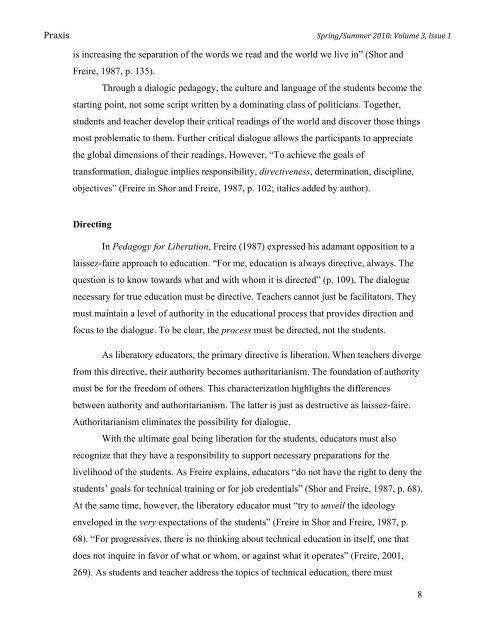PRAXIS - Paulo Freire Institute
PRAXIS - Paulo Freire Institute
PRAXIS - Paulo Freire Institute
- No tags were found...
Create successful ePaper yourself
Turn your PDF publications into a flip-book with our unique Google optimized e-Paper software.
Praxis Spring/Summer 2010: Volume 3, Issue 1<br />
is increasing the separation of the words we read and the world we live in” (Shor and<br />
<strong>Freire</strong>, 1987, p. 135).<br />
Through a dialogic pedagogy, the culture and language of the students become the<br />
starting point, not some script written by a dominating class of politicians. Together,<br />
students and teacher develop their critical readings of the world and discover those things<br />
most problematic to them. Further critical dialogue allows the participants to appreciate<br />
the global dimensions of their readings. However, “To achieve the goals of<br />
transformation, dialogue implies responsibility, directiveness, determination, discipline,<br />
objectives” (<strong>Freire</strong> in Shor and <strong>Freire</strong>, 1987, p. 102; italics added by author).<br />
Directing<br />
In Pedagogy for Liberation, <strong>Freire</strong> (1987) expressed his adamant opposition to a<br />
laissez-faire approach to education. “For me, education is always directive, always. The<br />
question is to know towards what and with whom it is directed” (p. 109). The dialogue<br />
necessary for true education must be directive. Teachers cannot just be facilitators. They<br />
must maintain a level of authority in the educational process that provides direction and<br />
focus to the dialogue. To be clear, the process must be directed, not the students.<br />
As liberatory educators, the primary directive is liberation. When teachers diverge<br />
from this directive, their authority becomes authoritarianism. The foundation of authority<br />
must be for the freedom of others. This characterization highlights the differences<br />
between authority and authoritarianism. The latter is just as destructive as laissez-faire.<br />
Authoritarianism eliminates the possibility for dialogue.<br />
With the ultimate goal being liberation for the students, educators must also<br />
recognize that they have a responsibility to support necessary preparations for the<br />
livelihood of the students. As <strong>Freire</strong> explains, educators “do not have the right to deny the<br />
students’ goals for technical training or for job credentials” (Shor and <strong>Freire</strong>, 1987, p. 68).<br />
At the same time, however, the liberatory educator must “try to unveil the ideology<br />
enveloped in the very expectations of the students” (<strong>Freire</strong> in Shor and <strong>Freire</strong>, 1987, p.<br />
68). “For progressives, there is no thinking about technical education in itself, one that<br />
does not inquire in favor of what or whom, or against what it operates” (<strong>Freire</strong>, 2001,<br />
269). As students and teacher address the topics of technical education, there must<br />
8


